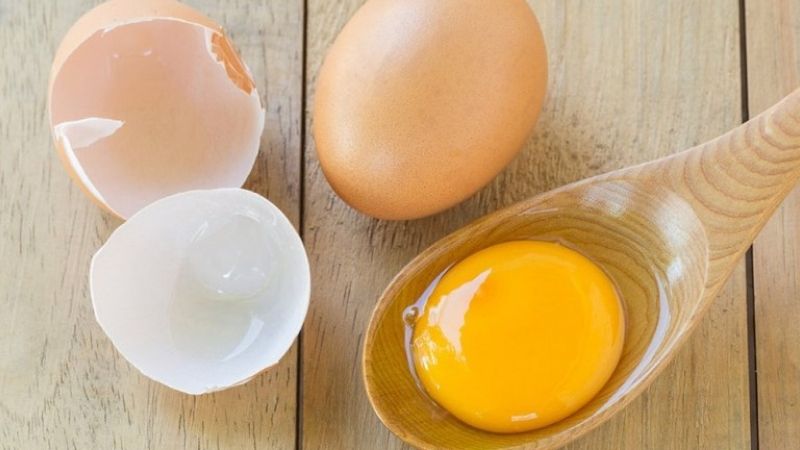Fried eggs are a popular dish due to their simple preparation and delicious, easy-to-eat flavor. However, the use of oil in frying eggs also makes many people wary of the potential high-calorie content.
In particular, how many calories are in a fried egg? And will eating fried eggs make you fat? These are common questions among dieters, and we will provide detailed answers in this article.
1. How many calories are in 100g of fried eggs?
 Calorie content in different types of fried eggs
Calorie content in different types of fried eggs
The calorie content of various fried egg dishes are as follows:
-
Fried duck egg: Approximately 140 kcal
-
Fried chicken egg: Approximately 110 kcal
-
Fried goose egg: Approximately 280 kcal
-
Fried quail egg: Approximately 280 kcal
However, the calorie count can vary depending on the amount and type of oil used.
According to research by the United States Department of Agriculture (USDA), a large chicken egg (100g) contains about 90 calories, a medium-sized egg (50g) contains about 70 calories, and a small egg contains about 50 calories. A boiled chicken egg contains approximately 78 calories.
2. Nutritional composition of fried eggs
Chicken eggs consist of two main parts: the yolk and the egg white. The yolk accounts for about 31.9% of the egg’s weight and is the most nutrient-rich part of the egg. The egg white makes up about 55.8% of the weight but has a lower nutritional content compared to the yolk.
Additionally, the protein in eggs helps reduce the body’s cholesterol production, keeping cholesterol levels in the blood from rising too high.
Specifically:
-
Protein: 14.8g
-
Fat: 11.6g
-
Carbohydrates: 0.5g
-
Fiber: 0g
-
Vitamins: folate (47 mcg), vitamin B12 (1.29 mcg), vitamin B2 (700 mcg), vitamin A (0.88 mcg), vitamin D (0.3 mcg), etc.
-
Minerals: Calcium (55 mg), Iron (2.7 mg), Phosphorus (176 mg), Potassium (0.9 mg), Magnesium (11 mg), etc.
Eggs are a nutrient-rich food, but few people know exactly how many calories are in an egg. Let’s find out more about this fascinating topic!
 Nutritional composition of fried eggs
Nutritional composition of fried eggs
3. What are the benefits of eating chicken eggs?
Chicken eggs are a good source of nutrition and offer various health benefits:
Increase good cholesterol levels
According to a study, consuming two eggs per day for six consecutive weeks increased HDL (good) cholesterol levels by 10%, which is a significant benefit for overall health.
Reduce the risk of stroke
Multiple studies have shown that eating eggs daily can reduce the risk of stroke and hemorrhage by 26%. People who eat eggs also have a 28% lower risk of dying from a stroke and a 12% lower risk of heart disease.
 Chicken eggs reduce the risk of stroke
Chicken eggs reduce the risk of stroke
Beneficial for eye health
According to Vinmec International General Hospital, eggs contain lutein and zeaxanthin, which help reduce the risk of cataracts and age-related macular degeneration by fighting oxidation. Additionally, the high vitamin A content in eggs promotes healthier eyes.
Promote muscle growth and bone health
Chicken eggs are an excellent source of protein, providing essential amino acids that help increase muscle mass and strengthen bones.
Support weight loss
Incorporating chicken eggs into a low-calorie diet can accelerate weight loss. Eating eggs in the morning helps you stay fuller for longer and reduces cravings, making weight loss more effective.
 Chicken eggs aid in weight loss
Chicken eggs aid in weight loss
4. Will eating fried eggs make you fat?
 Fried eggs do not cause weight gain and are suitable for dieting
Fried eggs do not cause weight gain and are suitable for dieting
Eggs are a nutrient-rich food that provides essential nutrients and energy to the human body. According to nutrition experts, an adult needs to consume about 2000 calories per day.
However, a fried egg only contains about 90-100 calories, so it is clear that eating fried eggs will not make you fat. On the contrary, when consumed as part of a balanced diet, this delicious food can offer various health benefits.
Additionally, eggs are rich in vitamins such as B1, B2, B6, and B12, which are great for the body. In particular, vitamin B12 helps blood cells function optimally, improves heart health, and boosts immunity.
5. Is it healthy to eat a lot of fried eggs?
While fried eggs are tasty, easy to make, and nutritious, consuming too many is not advisable.
Fried eggs contain a lot of oil, and excessive consumption can lead to obesity, weight gain, digestive issues, and skin problems. Additionally, eating too many eggs can have negative effects on overall health.
 Avoid eating too many fried eggs
Avoid eating too many fried eggs
If you are generally healthy, you should limit your egg intake to no more than two eggs per day. However, it is best to eat them intermittently, such as one week on and one week off.
People with heart disease, liver disease, or high blood pressure should limit their egg consumption to no more than three eggs per week to avoid adverse health effects.
6. How to eat fried eggs without gaining weight
 Tips for eating fried eggs to maintain a slim figure
Tips for eating fried eggs to maintain a slim figure
While fried eggs are a good source of nutrients, it is essential to prepare and consume them in moderation.
Here are some tips for eating fried eggs in a healthy way that will help you get the necessary calories while maintaining a healthy weight and a slim figure:
Eat fried eggs in the morning
 Eat fried eggs in the morning and avoid eating them at night
Eat fried eggs in the morning and avoid eating them at night
Eating eggs in the morning will keep you feeling fuller for longer, reducing hunger pangs. Avoid eating fried eggs at night, as this can cause digestive issues and bloating.
Control the amount of oil used
 Use healthy oils in moderation
Use healthy oils in moderation
Make sure you don’t use too much oil when frying eggs. Opt for healthier oils like olive oil or avocado oil.
Pair fried eggs with vegetables
 Fried eggs taste great with a variety of vegetables
Fried eggs taste great with a variety of vegetables
Fried eggs are even more delicious when paired with different vegetables, and you’ll get a boost of essential nutrients as well.
Eat more egg whites
 Eating more egg whites helps build lean muscle
Eating more egg whites helps build lean muscle
While egg whites have lower protein content than yolks, they help build and tone lean muscle.
Avoid eating raw eggs
 Raw eggs contain antitrypsin, which hinders protein absorption and digestion
Raw eggs contain antitrypsin, which hinders protein absorption and digestion
Raw eggs contain a substance called antitrypsin, which can interfere with protein absorption and digestion. This can lead to excess fat accumulation and weight gain.
Limit yourself to two eggs per day
 Limit yourself to two eggs per day and three to four eggs per week
Limit yourself to two eggs per day and three to four eggs per week
Ideally, you should eat no more than two eggs per day and three to four eggs per week. Consuming more than this can lead to excess fat and weight gain.
7. Delicious dishes made with chicken eggs
Soy-braised eggs
This dish is incredibly easy to make. All you need are a few chicken eggs, scallions, soy sauce, and some common seasonings. The rich, creamy texture of the eggs pairs perfectly with the salty, savory flavor of the soy sauce. It’s a great dish to have with rice, especially on rainy days.
Reference: https://www.webtretho.com/forum/f3173/trung-hap-nuoc-tuong-ngon-don-gian-2303623
 Soy-braised eggs
Soy-braised eggs
Fried eggs with tomatoes
When it comes to egg dishes, you can’t forget fried eggs with tomatoes. The soft, creamy eggs and the slightly tangy tomatoes create a perfect balance of flavors. It’s a dish that never gets boring.
Reference: https://www.webtretho.com/forum/f3173/trung-chien-ca-chua-ngon-don-gian-2303624
































